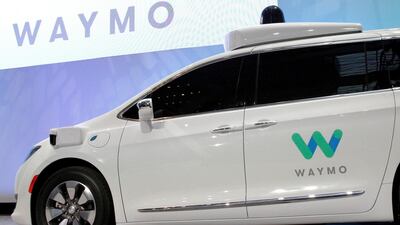Self-driving cars developed by Waymo – the arm of Google owner Alphabet developing driverless vehicles – need less help from humans sitting in the front seat than rivals, although General Motors is catching up quickly.
The Alphabet unit's cars drove in autonomous mode for more than 566,000 kilometres on California public roads last year, and engineers took control just 63 times, according to a report filed to the state. Waymo and GM both disengaged their self-driving systems during testing less than once per 1,600km.
California's annual reports are a rare and incomplete snapshot of how self-driving cars are coming along for the car makers, suppliers, tech giants and start-ups in the hotly contested space. Other states have lured companies to test by opting against requiring such disclosures. And engineers also are logging countless test kilometres on closed tracks and in labs using videogame-like simulation.
Waymo's 0.18 disengagements [from driverless travel] per 1,600km compares with 0.8 for GM, which improved from a rate of about 18 during the year-earlier period. The companies' 2017 reports to California's Department of Motor Vehicles span the 12 months ending in November.
GM’s self-driving Chevrolet Bolts are equipped with systems designed by its San Francisco-based Cruise Automation unit. A spokesman for the car maker declined to comment on its report.
Cruise CEO Kyle Vogt wrote in an October blog entry that GM is testing in dense urban environments, including San Francisco to, put its cars through tougher challenges, while other companies are resorting to easier-to-navigate suburban streets.
“Our vehicles encounter challenging (and often absurd) situations up to 46 times more often than other places self-driving cars are tested,” Mr Vogt wrote. “Perhaps for this reason, nobody else is regularly testing self-driving cars in SF.”
Waymo doubled its total miles tested last year to almost , 3.2 million km, according to a blog post. The company reduced the amount of driving on public roads in its home state by almost half from 2016. It's expanded testing elsewhere, including Texas, Washington and Arizona, where it's planning to begin a commercial service later this year.

